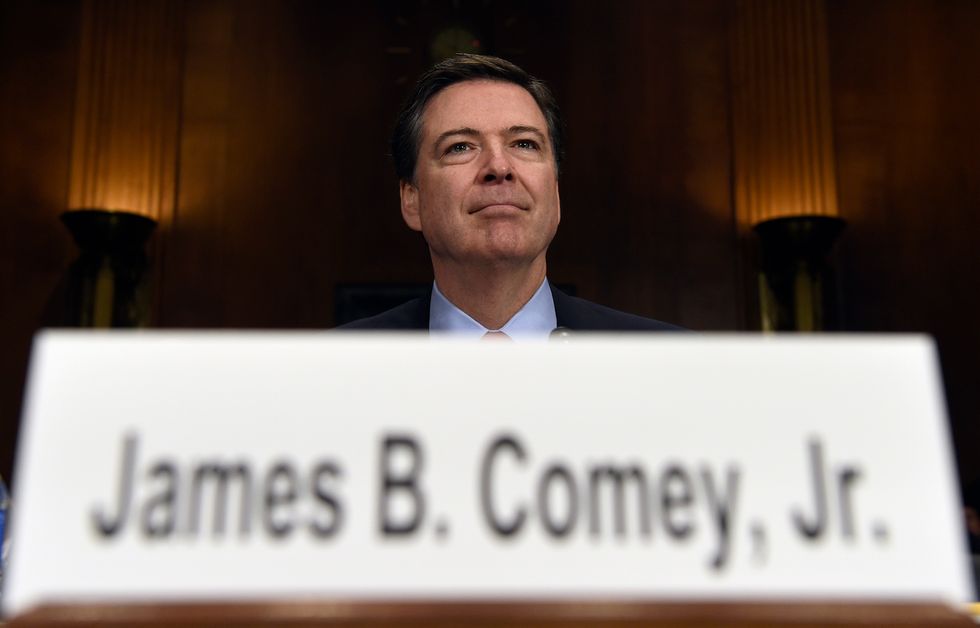
FBI Director James Comey prepares to testify on Capitol Hill in Washington. (AP Photo/Susan Walsh, File)

It’s now eight days from Election Day, and if there’s one thing Democrats agree on, it’s that James Comey, the director of the Federal Bureau of Investigation, should definitely not have sent a letter to Congress advising them that the FBI was reopening its investigation of Democratic presidential nominee Hillary Clinton’s use of a private email server during her tenure as secretary of State. Regardless of the fact that none of these Democrats (and Republicans, in some cases) know what has been uncovered as a result of the FBI’s probe, they all agree that what Comey has done is just so darn irresponsible, what with it being this close to an election and all.
But imagine, if you will, an alternate universe. A universe in which James Comey was notified by his agents last week that they had found new emails that were potentially relevant to the Clinton investigation, but they weren’t yet able to assess the significance of these emails to the Clinton investigation. In this alternate universe, imagine that Comey did not go public with his knowledge, and Clinton skated to a relatively easy victory over Republican nominee Donald Trump, and Democrats took control of the House and Senate.
Then imagine that on Dec. 1 his agents concluded that the emails they found on Clinton aide Huma Abedin’s computer clearly demonstrated the criminal intent Comey found lacking earlier this year, and he announced publicly that he was reversing course and recommending that the Department of Justice indict both President-elect Clinton and Abedin, currently serving as head of her transition staff, on numerous felony counts.
Are we to believe that the same Democrats who are currently flipping out over Comey’s alleged attempt to affect the election would actually laud Comey’s decision to keep his mouth shut until after the election? Are we to believe that Maryland Democratic Rep. Elijah Cummings, the newly minted chairman of the House Committee on Oversight and Government Reform, would not take the opportunity to grandstand endlessly, asking at every turn, “What did Director Comey know, and when did he know it?”
Imagine the grilling Comey would receive if he relied on “department policy” to explain why his agency sat on information that they knew might lead to the indictment of one of the two presidential candidates until after the election. Imagine the recriminations: “Don’t you think the country deserved to know that you had evidence in your possession that you intended to use to recommend the indictment of the probable next president of the United States?”
Given what we know now, which is that Comey’s agents had possession of these emails weeks ago and just recently informed him of their existence, the Monday-morning quarterbacking of the decision to sit on this evidence until after the election because some alleged FBI policy called for that to happen would be absolutely unprecedented in scale – by both Democrats and Republicans.
More importantly, though, the extent to which the American public would have engaged in recriminations would have been unprecedented in scale. If Comey and the FBI had recommended an indictment after the election of Hillary Clinton and not notified the public before the election, the voting public’s faith in the electoral process would have suffered a severe and likely permanent blow.
If Comey decides to recommend an indictment for the president-elect of the United States, he will be touching off a constitutional crisis the likes of which we have not seen since Watergate. Asking the Department of Justice to fairly and fully prosecute and investigate a criminal complaint against their future boss will send us into virtually uncharted waters as a country.
Comey may not know what those emails contain yet or what their potential significance is, but he knows that a disastrous public crisis is a possible result. That isn’t Comey’s fault, contrary to the claims of many Democrats today: It’s the fault of the Democratic nominee for president, who decided that her own political career was more important than national security.
Failure to warn the American public that voting for Hillary might lead to such a crisis would be far more irresponsible than sending a letter to Congress and keeping the public informed. And if he had not done so, you can bet that both Democrats, Republicans and all other voters would have held rightly held him responsible for doing so.